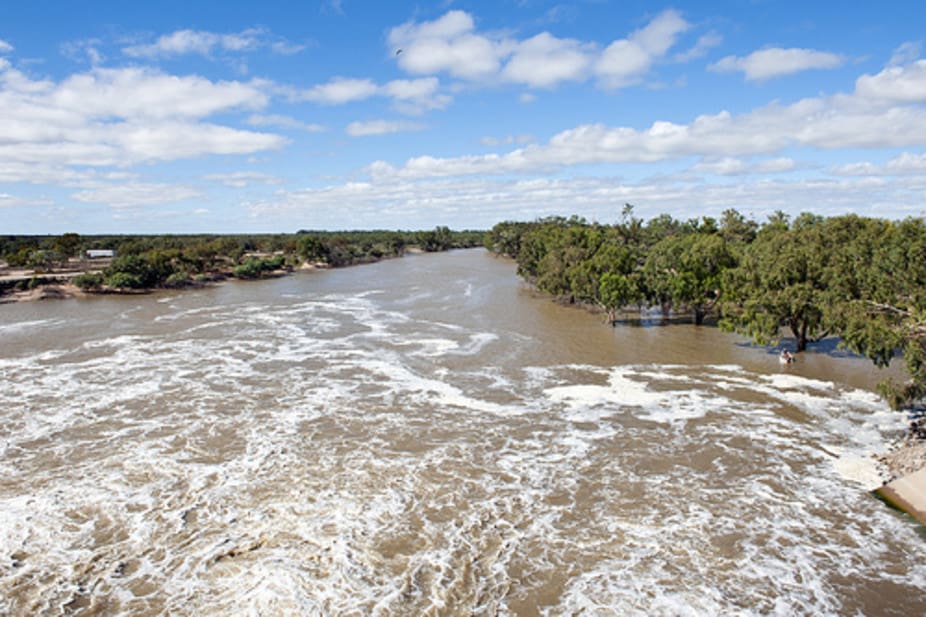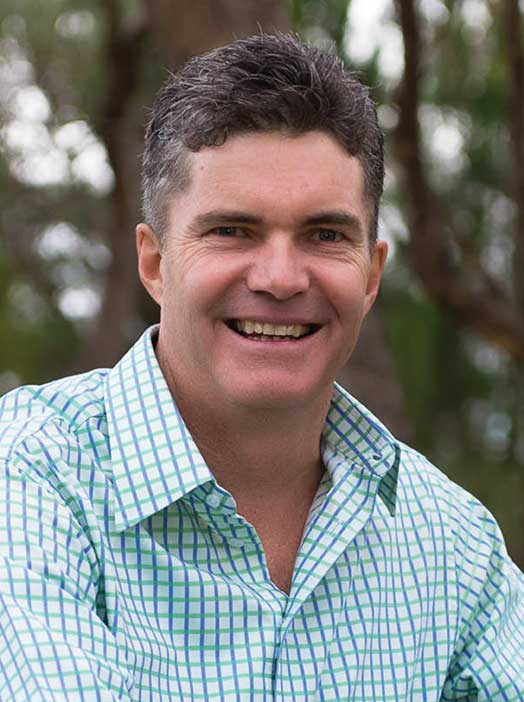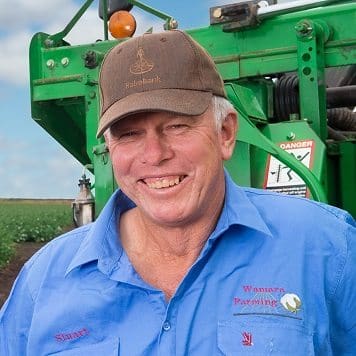ABC television’s Four Corners ‘Cash Splash’ program last night called into question the Murray Darling Basin’s multi-million-dollar irrigation efficiency scheme.
The scheme provides financial incentive for irrigators to upgrade infrastructure to save water in return for giving up water that is then returned to the river.
The Four Corners program asserted the $4 billion spent so far was a “waste of taxpayers’ money” as it lacked transparency and accountability, and that some operators were rorting the system.
Responses to the program include:
National Irrigators’ Council (NIC) chief executive officer, Steve Whan:
“Irrigators make absolutely no apology for wanting to ensure country towns and our farmers have a future. That’s why when Government decides it is going to acquire water for the environment, we will always actively work to try to ensure that water is acquired through water saving rather than buyback.
“Any look at history will tell you irrigators did not (and do not) want Government taking irrigation water out of production. Despite that, our industry has cooperated in an attempt to play a positive role in achieving healthy rivers – but at the same time healthy communities and a continued capacity to grow food and fibre.
“Extensive community by community research proves that buyback costs jobs, population and production. Negative impacts that can be reduced, or even reversed, if extra funds are set aside to improve productivity at the same time.
“That is exactly why the then Labor Government put in place the Private Irrigation Infrastructure Operators Program (PIIOP) and the On-Farm Irrigation Efficiency Program (OFIEP). These programs were administered by the Federal Department of Agriculture who allocated a total of $1.4 billion acquiring (a nominal) 345 billion litres of water.
“Overall the feedback and the economic studies indicate they these programs have done their job. Yes, the water cost more per megalitre than (the then) market price. But that is exactly what the Government said it would do, because the benefit was for the community and production.
“We expect Government to ensure that funds are spent appropriately, we support full transparency of expenditure and rigorous audit.
The NIC also pointed out:
- Water has been returned to the environment, as contracted, and it has been audited;
- Water can be purchased by any farmer, but there is overall 20% less available for irrigation;
- The Basin Plan does take into account underutilised licences;
- Annual accounting of the Sustainable Diversion Limit should provide the overall water accounts we all want to see.
“The Basin Plan is the world’s most ambitious environmental plan for a river system. It will be difficult, but it is made even harder if each side sees it as a winner takes all struggle, rather than a plan that, inevitably, involves compromise.”
Minister for Water Resources, Drought, Rural Finance, Natural Disaster and Emergency Management, David Littleproud
“The Coalition is proud to invest in water efficiency projects because they return water to the river system whilst protecting rural jobs and communities rather than decimating them as water buybacks do. It is unfortunate Four Corners did not mention this crucial fact.
“The Coalition uses water efficiency projects instead of water buybacks to recover water because water buybacks mean less farm production, less harvesting and packing jobs in small towns, and less money spent in the local pubs and restaurants. Water efficiency projects began under the previous Labor Government, after it had bought back nearly 1200 gigalitres (GL) of water and literally thousands of rural jobs were lost. The Coalition promised before the 2013 election to use water efficiency projects to recover water and we’ve delivered our promise.
“The Plan has so far delivered 2100GL of water back to the river system with about another 500GL to go. 1200GL was recovered through buybacks mostly under Labor, 700GL through water efficiency projects and the balance through state government programs and gifted water.
“Recovering large parcels of water from a company through water efficiency projects instead of effectively closing dozens of family farms in a small community through water buybacks is unarguably much better for those communities and the real families who live in them.
“The water efficiency projects help farmers grow more with less water through projects such as replacing leaking old drains with modern pipes to save water, and as trade-off the farmer gives up some water entitlement which goes back to the river and is NOT available for purchase by irrigators again. Other common projects include installing “drip irrigation” to deliver dripping water directly to tree roots through a network of small pipes, to replace huge sprinklers or the flooding of entire paddocks.
“Taxpayer funded water efficiency projects help farmers grow more with less water, and return water to the river system. This way the river, the farmer and the community all win – the river gets more water, the farmer produces as much or more produce and this protects jobs for the local community. If that farmer or company uses other money to plant other crops or buy other water; that’s up to them so long as all approvals are met. Australia is a free country.
“Building a dam does not give a farmer more water entitlement.
Planting almonds, nuts or any other water intensive crop does not give a farmer more water entitlement.
Water entitlements are bought and sold on the open market and farmers are increasingly using them to grow the highest value crops, including almonds and other nuts as well as cotton. Planning issues are a matter for state and local governments. To suggest farmers are switching to high value crops because water is recovered through water efficiency projects is silly. They are switching to high value crops because they return more to the farmer.
“Water efficiency works are subject to risk-targeted spot audits by the federal Department of Agriculture, which has also had Deloitte carry out a separate audit. The Department began the process to audit a major irrigation company (Websters) a few weeks ago. Delivery partners also check infrastructure works.
“Comparing the value of water at buyback to water recovered through job-saving water efficiency projects is comparing apples and oranges. Water efficiency upgrades cost more in the short term but save jobs in perpetuity. We’re proud we invest more to protect rural jobs – that’s our policy.
“Some 95 per cent of the On Farm Irrigation Efficiency Program projects are worth less than $1 million, with average project size of $152,000 across the 1500 projects. These are almost all small projects involving small farmers, not big companies.
“I have made unprecedented investments in compliance – $35 million for river water level sensors and satellite monitoring, $25 million for water metering in the northern basin, $5 million for river level video cameras and I’ve also created the first Northern Basin Commissioner – former AFP Commissioner Mick Keelty.
“Regarding complaints about speculators in the water market, I announced in May the ACCC would investigate the water market and its functions and I will have more to say about this soon.”
“The Murray Darling Basin Plan aims to recover about a fifth of the water farmers were using to give back to the river system. Nearly four-fifths of water recovery is complete.”
Cotton Australia general manager, Michael Murray
“It is beyond disappointing to once again see the ABC’s Four Corners program use its influential position to air another biased, inaccurate piece of journalism.
“The ‘Cash Splash’ story was riddled with factual errors and guided the audience down a path of misrepresentation about the fundamentals of the Murray-Darling Basin Plan.
“It is understandable that the average viewer might have concerns about the Plan’s irrigation efficiency programs that the show focused on.
“Given the way the show was presented, it would be understandable for a viewer to question whether the environment has gained anything under the Plan.
“However, at no stage did the episode attempt to explain how the Basin Plan has recovered 2100GL of water for the environment, with just under 700GL coming from irrigation efficiency and infrastructure projects. There also wasn’t any effort to highlight the economic stimulus communities have received from the programs, rather than the economic devastation straight ‘buybacks’ have afflicted on many Basin communities.
“The idea propagated by Four Corners that irrigators are ‘using more water’ by taking up water efficiency schemes is false. The only way an irrigator can acquire more water is if they buy a licence that allows them access to more water from the existing water licence pool.
“Under the Plan, the government can either purchase water through buybacks or acquire water through funding irrigation efficiency schemes.
“While the upfront cost of buybacks is cheaper, the irrigator and their local community cannot make up for the lost production by the entitlement leaving the productive side for the environmental side.
“Efficiency projects are a more appropriate option because irrigators can do more with their remaining water, thereby underpinning communities.
“Here is the accurate breakdown of the efficiency scheme process that Four Corners so spectacularly failed to explain:
- The water entitlement-holder nominates how much water their proposed project will save, and what works need to be done.
- The Commonwealth (either directly, through the states, or another third-party) then agrees on how much to fund the project and what share of the estimated savings it requires (normally 50%).
- The Commonwealth’s share of the water entitlement is then transferred to its holdings as a licence entitlement.
“It is the irrigator who bears the risk; if the expected savings do not eventuate, there is no option for the irrigator to have the water entitlement returned.
“It is patently and demonstrably wrong to say there is no checking as to whether the savings are real. They are real, because the entitlement holder transfers the entitlement.
“It must be remembered that 90 per cent of Australian cotton farms are family-owned; but we are proud of all our growers, be they family farms or agricultural corporations. As an industry, we support the right of irrigation licence holders to deal with their entitlements as they see fit, including selling them to the government. However, for the sake of Australia’s agricultural capacity, food security and regional communities, we prefer water is recovered through efficiency measures.
“We acknowledge that there are public concerns around water management in this country. While we agree the Murray-Darling Basin Plan is not perfect, we continue to support its full implementation as it was conceived in 2012 and re-agreed to by state and federal water ministers in 2018. Why? Because it is the best and only deal that could be achieved by the Basin states and the Commonwealth after years of negotiation.
“We are in the middle of an extreme drought. No party (the environment or irrigators) have the water they want; but the Plan, and the water it has secured for the environment, is delivering right now, with environmental flows making their way through the Basin.
“We call on critics of the Plan to act as positive players in this debate, rather than squeaky wheels. Farmers in drought-affected parts of Australia are doing it tough, cotton farmers included. This season, our crop was reduced by half due to the effects of drought, and will be reduced by half again next season if there is not any rain. Under the Plan, water licence holders are the last to receive water allocations after critical human needs and the environment receive their share. We implore Australians to understand the facts and details around these important water issues before they blithely take to social media and venomously attack our farmers.
“It is highly disappointing to watch the ABC once again wilfully disregard its own Charter requiring journalistic accuracy, balance and fairness, in order to satisfy its hunger for producing sensationalist television stories. We condemn the continued unbalanced reporting from the national broadcaster and call on them to do their job – report balanced, fair and factual pieces of journalism. This is a call we will not back down on.”
Queensland Farmers’ Federation president Stuart Armitage
The Queensland Farmers’ Federation (QFF) has expressed disappointment in ABC’s Four Corners program after it failed to represent the full picture of irrigation and water management in the Murray Darling Basin.
QFF president Stuart Armitage said under the Murray Darling Basin Plan there was a set limit on the amount of water that could be used for farming, with the fundamental purpose of the Plan being to further reduce this cap to a more sustainable level through water infrastructure programs.
“As a result of this cap, the total amount of water used by farmers does not change, regardless of the type of crops that are grown. And if the amount of water used on one farm increases from the purchase of water, the amount used on another farm must decrease from the sale of that water,” Mr Armitage said.
“Farmers will use their water allocation to grow the most profitable crops available to continue their business, support their families, employ local people and underpin regional economies.”
Mr Armitage said it was critical that government water policies were aimed at meeting environmental, economic and social outcomes.
“There is a general recognition that the Murray-Darling Basin Plan has failed to achieve these social outcomes as evidenced by the devastation of many basin communities. For example, Dirranbandi has lost 27 per cent of its irrigated area while in St George, jobs in agriculture have dropped by more than 15pc and non-agriculture private sector jobs are down more than 20pc,” Mr Armitage said.
“The water infrastructure programs have provided much needed certainty for farmers and Basin communities so they can keep farming and support their local communities.
“Born from compromise, the Basin Plan is the best chance to ensure we better manage a scarce resource, hold water for the environment while ensuring a sustainable level of consumptive take, and fairly address damaging socio-economic impacts.”
Ricegrowers’ Association of Australia statement
The Ricegrowers’ Association of Australia (RGA) says the Murray Darling Basin Plan is the most ambitious and controversial water reform programs globally.
The purpose of the Basin Plan is to reduce the limits on how much water can be taken from the Basin for irrigation, drinking water, industry or for other purposes without having a negative impact on the environment – the revised limits are called Sustainable Diversion Limits, or SDLs and came into effect in 2019.
The infrastructure programs under the Murray Darling Basin Plan, including the On-farm Irrigation Efficiency Program (OFIEP) and Private Irrigation Infrastructure Operators Program (PIIOP), have proven to be the most sustainable means of recovering water for the environment.
Under the Basin Plan, irrigation farmers have worked with the Commonwealth to return nearly 20 per cent of the water previously used for irrigation to the environment. That’s over 2100 billion litres of water to the environment, with 640 billion litres as a result of irrigation farmers improving their water efficiency.
Murrumbidgee infrastructure programs alone have contributed 10pc of the Basin’s water recovery target, that’s 262GL back to the environment –262 billion litres or more than half of Sydney harbour every year (on average). The Murrumbidgee valley’s recovery efforts mean that this valley has already met the Sustainable Diversion Limit water recovery requirements set by MDBP.
These programs rely on a transfer of what was previously irrigation water from the irrigator to the Federal Government. For the project to be approved, the irrigator and the federal government agree to a conditional contract of sale whereby the irrigator transfers water to the federal government for a payment. Rather than being a direct purchase however, the contract is conditional upon the irrigator using this payment for the purpose of undertaking works that must be demonstrated to improve the water-use efficiency of the irrigation system or their farming enterprise.
There is a formal process for program participants, whereby water and farm specialists perform a technical audit at each stage of the program. This is to ensure that the outcomes can be measured accurately. Program participants are responsible for delivering within their project guidelines. Any over-runs are borne by the participant – not the environment – the water is returned regardless.
All on and off-farm efficiency programs are delivered via tender and have been audited by the Commonwealth Auditor General. In each case the Government has provided the water purchased as part of the program to the Commonwealth Environmental Water Holder.
The RGA and the irrigation industry as a whole has long sought that water be recovered for the environment through Infrastructure Programs rather than direct buy-backs, as these programs facilitate communities and irrigation industry to adjust to a future with less water for production. These programs have achieved their aim of returning water to the environment while still supporting Australia’s food and fibre producers, and have allowed the water recovery targets under the Basin Plan to be met without decimating irrigation communities.
These programs are a means of trying to ensure some kind of sustainable future for the thousands of families dependent on irrigated agriculture, while at the same time providing for a healthy Murray Darling Basin for generations to come.
Irrigation Australia chief executive officer, Bryan Ward
Viewers could be excused for thinking that shutting down leaky channels and replacing them with pipes was a negative outcome – the reality is quite the opposite” says Bryan Ward, CEO of Irrigation Australia chief executive officer, Bryan Ward, said.
Irrigation Australia is the body that trains and accredits water industry professionals and whose members build and install Australia’s modern and efficient irrigation systems.
“It is most disappointing that capital programs to improve water infrastructure have been portrayed by Four Corners as negative, when in fact, these programs have enabled investment in agriculture and reduced water use on farm meaning more water is returned to the environment,” Mr Ward said.
“Increased investment in agriculture benefits all Australians. Irrigation Australia’s members employ thousands of people in regional centres because we have an irrigation industry, and these jobs and incomes would be gone if irrigated agriculture disappeared.
“On at least two occasions, the report attempted to say that because farmers may have undertaken this work themselves, at some stage in the future, this qualified as a waste of commonwealth money. No mention was made of the fact that if farmers funded this infrastructure themselves, they would not have been required to give up a share of their water entitlement.
“Our members are very proud of the role their technical knowledge and modern products have played in making Australia one of the world’s most efficient and sustainable producers of food and fibre. I’m sure most Australians would join them in their pride.
“Large investments, by customer owned companies such as Murrumbidgee Irrigation, to improve the efficient use of water, have been very successful and have enabled the water saved to be returned to the river system.
“Anyone who has followed the history of dealing with salinity, runoff and now with saving water for the environment would actually know that upgrading old leaky channels is a positive.
“The Plan has, so far, delivered 2100GL of water back to the river system and almost 700GL of this has been the result of water efficiency projects. Our members have been proud to be involved in delivering these savings and making Murray Darling irrigators among the world’s most productive – while at the same time delivering a real environmental benefit.
“Irrigation Australia supports full transparency and a rigorous review of all investments involving commonwealth funds, but it is important to record that investment decisions were not made solely on the grants provided under the On Farm Efficiency Program and the majority of invested funds have come directly from the farmers themselves.”
Murray-Darling Basin Authority statement
The Murray–Darling Basin Authority (MDBA) stands by the fundamentals of the Basin Plan which is delivering real water to the environment while doing the least harm to farming communities.
More than 2000GL of water is now held for the environment and is being used to make a real difference, for example in the north to protect native fish from further fish kill events.
Every year the MDBA checks that Murray–Darling Basin water take limits are being met. The latest report finds that farmers are not taking more water than is allowed under the Basin Plan.
While direct water purchase is cheaper than investing in irrigation infrastructure, research shows it causes more social and economic harm to regional communities.
The MDBA does not have a role in administering water recovery programs. Design, operation and delivery of water recovery programs is a matter for the Federal Department of Agriculture.
The MDBA was not approached by Four Corners for interview or comment.
Sources: NIC, Federal Government, Cotton Australia, QFF, MDBA








There is much mention of “water is going back into the environment” – does this mean the saved water is going back into the rivers because that is where we want it to go.
Are more dams being built on properties – what about water wastage with evaporation?
What about now building the pipeline from the north (talked about & suggested years ago) & bring the excess wet season water down to the south.
Various people who were interviewed on the ABC were experienced in water matters, they seem to have good ideas too, couldn’t you all work in together for the sake of the river system.
Surely what they said was not “all wrong”?
We Australians want excellent handling of our rivers.
Why did all those fish die?
What does Ita Buttrose think of how her journalists have managed this latest 4 Corners program? She has shown interest in addressing the ABC bias problem.
Great response, would be very beneficial if we ( relative agricultural bodies) could do a follow up on perhaps “landline” to project an apposing point of view.
Otherwise i am afraid we will collectively loose the argument in the public arena.
We also need desperately a “where too from here” segment , in order to steer the community and relative govt authorities in the right direction.
This cannot be understated, especially when water is such a scarce resource during drought periods.
It has to project in my mind a sense of inclusiveness with respect to the community, farmers, graziers and regulatory authorities.
all the best!!
How sad it is that our tax payer funded national broadcaster continues to mis-represent and poorly research, and make the wildest of allegations about matters of national importance.
The 4 corners program aired last night is another in a long list of biased, poorly researched reports on matters of National Importance , alleging a long list improprieties, with not a dot of proof to back up these allegations.
Perhaps the best thing to do with the ABC would be to put it up for auction, then get rid of all the overpaid left wing journalists and see if they can get a job in the real world.